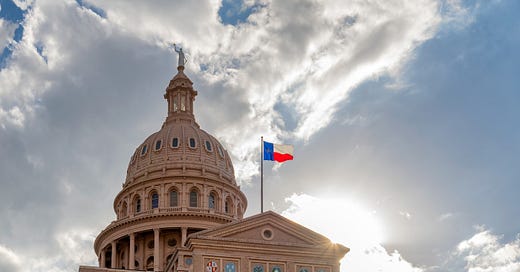UNT’s Misinterpretation of Texas Law Threatens Academic Freedom
University administrations should be standing up for academic freedom.
A troubling situation is brewing at University of North Texas (UNT), where its chief compliance officer has erroneously invoked a state law to offer guidance to faculty regarding research and course instruction.
The state law in question is SB 17, enacted in 2023. That law eliminated administrative offices that promoted Diversity, Equity, and Inclusion (DEI), barred campus administrators from conducting certain DEI trainings, prohibited affirmative action in the hiring process, and prohibited requiring job applicants to provide DEI statements.
As reported by the North Texas Daily, in an October presentation to the institution’s faculty senate, UNT’s chief compliance officer asserted that in order to comply with SB 17, “classroom lessons on DEI topics must be limited to elements of the course,” and that “course activities must relate to the course goal or objective.”
With respect to research, the chief compliance officer told the faculty senate, “The identity-based aspects must be essential to the research.” He continued, “So if you're doing research on homelessness, you have to be very careful if you're going to focus on a certain identity within homelessness. So if you're looking at LGBTQ homeless individuals, then you'll have to make sure that that is narrowly-tailored within the scope of work.”
The bill, however, explicitly stated that the legislation “may not be construed to apply to: (1) academic course instruction; (2) scholarly research or a creative work by an institution of higher education’s students, faculty, or other research personnel or the dissemination of that research or work.”
In its press release on the controversy PEN America’s Jeremy Young, argued, “The situation at UNT is one of the most extreme cases of overcompliance with a censorship law we have ever seen,” adding that, “by extending the reach of this law into areas explicitly protected by the legislation itself, UNT is not only misinterpreting the law but also putting faculty members’ academic freedom in severe jeopardy.”
HxA agrees. But even if the bill had not provided those clear exemptions, over 60 years of Supreme Court case law about academic freedom would preclude the government from interfering in college classrooms or in faculty research as articulated by the UNT guidance.
As far back as 1957, in Sweezy v. New Hampshire, the Supreme Court explained:
The essentiality of freedom in the community of American universities is almost self-evident. No one should underestimate the vital role in a democracy that is played by those who guide and train our youth. To impose any strait jacket upon the intellectual leaders in our colleges and universities would imperil the future of our Nation. No field of education is so thoroughly comprehended by man that new discoveries cannot yet be made. Particularly is that true in the social sciences, where few, if any, principles are accepted as absolutes. Scholarship cannot flourish in an atmosphere of suspicion and distrust. Teachers and students must always remain free to inquire, to study and to evaluate, to gain new maturity and understanding; otherwise, our civilization will stagnate and die.
A decade later, in Keyisian v. Board of Regents, the Court hammered the point home:
Our Nation is deeply committed to safeguarding academic freedom, which is of transcendent value to all of us, and not merely to the teachers concerned. That freedom is therefore a special concern of the First Amendment, which does not tolerate laws that cast a pall of orthodoxy over the classroom. The vigilant protection of constitutional freedoms is nowhere more vital than in the community of American schools. The classroom is peculiarly the "marketplace of ideas." The Nation's future depends upon leaders trained through wide exposure to that robust exchange of ideas which discovers truth out of a multitude of tongues, [rather] than through any kind of authoritative selection. [internal quotations omitted]
The Sweezy Court also touched on insulating research from external pressures. It stated:
Freedom to reason and freedom for disputation on the basis of observation and experiment are the necessary conditions for the advancement of scientific knowledge. A sense of freedom is also necessary for creative work in the arts which, equally with scientific research, is the concern of the university….It is the business of a university to provide that atmosphere which is most conducive to speculation, experiment and creation. It is an atmosphere in which there prevail 'the four essential freedoms' of a university—to determine for itself on academic grounds who may teach, what may be taught, how it shall be taught, and who may be admitted to study.
When pressed by the faculty senate on whether the UNT guidance violated academic freedom, the chief compliance officer answered, “I don’t think that this really impinges on academic freedom, because it’s a state law now. State law is kind of at the very top of the hierarchy when you’re determining what’s allowable within an institution and what’s not.”
But state laws that contradict constitutional rights are invalid. And if Sweezy and Keyisian stand for anything, it is the principle that the government cannot take actions—through legislation or otherwise—to ban ideas from being taught, discussed, debated, or researched by students or faculty at public institutions of higher education. If SB 17 actually required what UNT is claiming, UNT should not have enforced it, as it is attempting to. Instead, it should have stood up for academic freedom and challenged the law in court.
Unfortunately, the situation at UNT appears to be getting worse, not better. It’s been reported that UNT administrators have changed the titles and descriptions of many courses. One professor was notified by email that her graduate course for next semester, originally titled, "Race, Class and Gender Issues in Education," was now titled, “Critical Inquiry in Education.” The course description was altered, too.
According to CBS News, “Before, the course said students would learn how to be ‘culturally responsive’ to their own students and how to ’debunk stereotypes and negative views" about students going to school in places where ’race, class and gender inequalities exist.’ Now, the course says students will ‘critically examine current topics related to providing leadership for various student groups.’”
This was apparently only one of the 78 edits made to course titles and descriptions in the College of Education's graduate program. There were an eye popping 130 edits to course titles and descriptions in the College of Education's undergraduate program! It’s unclear from the reporting whether other colleges at UNT experienced similar interference.
To date, it also remains unclear as to whether the edits to the course titles and descriptions are intended to also preclude the faculty from exploring the deleted topics or if it was just an attempt to shield faculty from greater public scrutiny. But given the intrusions into the classroom in the SB 17 compliance guidance, it’s clear that the UNT administration is asserting at least some control over classroom content.
If any department has strayed from its academic focus into political activism, that can and should be addressed—but not by administrators and compliance officers striking words from faculty course titles and syllabi.
The edits have now been strongly condemned by a broad list of faculty and civil liberties advocates, including the ACLU of Texas, the Texas Conference of the American Association of University Professors, the Texas Faculty Association, the Foundation for Individual Rights and Expression (FIRE), and PEN America. Because we champion open inquiry and the academic expertise it depends on, Heterodox Academy is proud to add our name to those voicing objections. Removing all references to certain ideas from course titles and descriptions is simply incompatible with open inquiry. For this reason, we, too, object to administrative doctoring of course titles and syllabi.
We should note that the changes to the course titles and descriptions appeared to be designed as a defensive measure to appease lawmakers and the Lieutenant Governor’s office, to reduce their appetite to pursue legislation that would regulate the curriculum or pressure the institution to do so through the budget process when the legislature reconvenes in 2025.
In a September 10 memo, the Lieutenant Governor’s office directed the Texas Legislature’s Higher Education subcommittee to “[e]xamine programs and certificates at higher education institutions that maintain discriminatory diversity, equity, and inclusion (DEI) policies. Expose how these programs and their curriculum are damaging and not aligned with state workforce demands.” (emphasis added). In emails leaked to the North Texas Daily, the edits to the courses were initiated after the administration became aware of this memo. Indeed, during the October presentation to the Faculty Senate, the chief compliance officer set forth the rationale for his efforts to comply with SB 17, explaining “not only are we looking at legal risks that are presented with some of these activities, but we're also looking at the political risk that comes along with a lot of these…”.
It’s easy to understand why a campus administration fearful of government retaliation might try to preempt legislators who hold the purse strings, but when those efforts would infringe on constitutional rights, that simply is not an option. UNT’s administration should be standing up for academic freedom and should abandon its efforts to sanitize courses.






